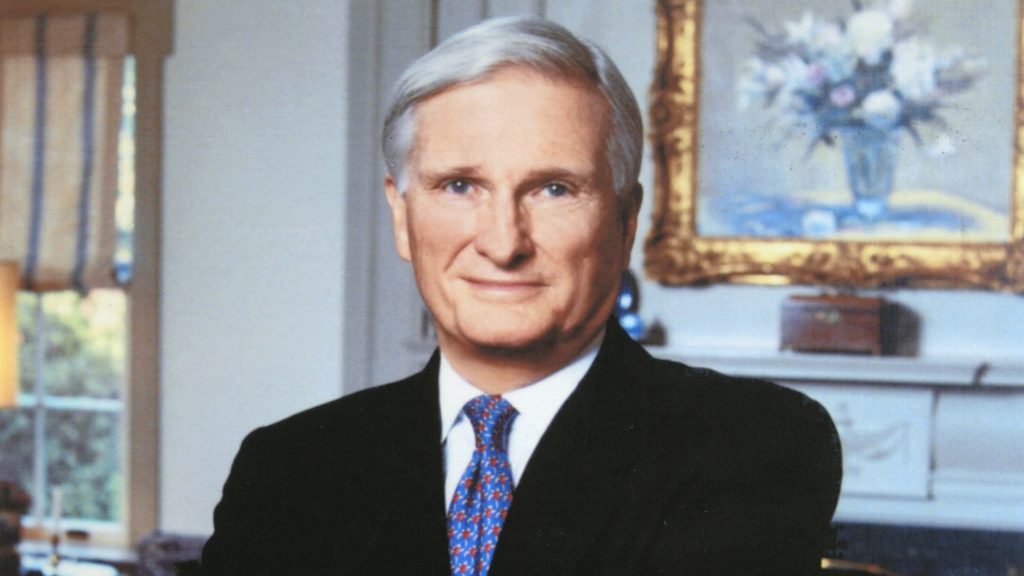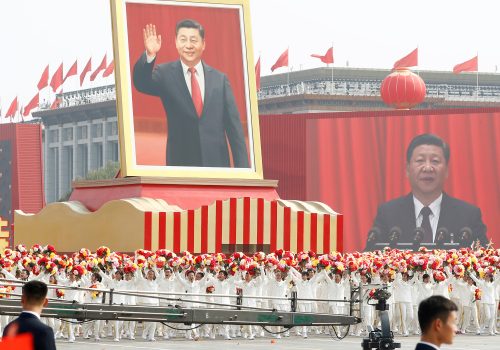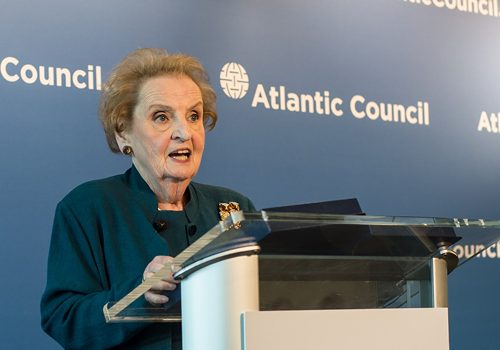Read more tributes to Atlantic Council board member DeVier Pierson below from Atlantic Council CEO Frederick Kempe, former Secretary of Defense Chuck Hagel, Virginia Mulberger, and John “Buck” Chapoton.
There was nothing ordinary about DeVier Pierson. Even at his birth in Oklahoma in 1931, his name, Welcome DeVier Pierson, Jr., was anything but commonplace. The “Welcome” was passed down from his father, and his mother found the name “DeVier” in a Sears Roebuck catalog. That striking name found its way to the heights of the White House counsel’s office, a distinguished legal career, and to a lengthy service on the Atlantic Council board of directors before DeVier’s death on April 21 at the age of ninety.
DeVier’s writing skills, which won him praise by government officials and judges for a half century, came to him naturally. At age eight, he set out to write a series of children’s books. He wrote short stories that were distributed to his classmates.
Speech lessons paid dividends when DeVier began winning oratorical contests. As a seventh grader he waxed eloquent about American ideals and the superiority of his country’s constitutional government:
But are we conscious of the fragile fabric of which it is woven? Do we stop to consider that it may slide through our hands as easily and noiselessly as a delicate piece of silk might slither through fingers and fall unnoticed on the floor?
In high school, DeVier’s skills as an orator became so well known that he was chosen to speak at the inaugural dinner of the Oklahoma City YMCA Building Fund Campaign. He was introduced by the governor of Oklahoma, prompting the local newspaper headline, “YMCA Keynote Sounded by Boy.”
DeVier’s uncommon life continued as he became a champion debater. In his senior year, he won the national championship in extemporaneous speaking. The night before the competition, DeVier had dinner with James Dean, a young man from Indiana who was entered in a dramatic reading competition at the national speech tournament. They wished each other luck and went their separate ways. Dean soon dropped out of college, went to Hollywood, and starred in films such as Rebel Without a Cause.
DeVier built on his reputation as an accomplished orator at the University of Oklahoma (OU) as a member of the national championship debate team. Upon graduation, he joined the US Army and served for two years during the Korean War. He then returned to OU and earned a law degree. At a moot court competition in New York City, he led his team to a national crown, prompting offers from Wall Street firms. Having no desire to live in New York, he entered private practice in Oklahoma City.
In 1965, US Sen. Mike Monroney of Oklahoma lured DeVier to Washington to serve as chief counsel to a joint congressional committee studying the reorganization of the federal government. Then, a phone call changed his life.
The call came from Harry McPherson, longtime adviser to US President Lyndon B. Johnson. DeVier was invited to a meeting at the White House and thought perhaps he was being considered for a staff position because his congressional committee work was winding down. When DeVier arrived at the White House, the guard looked at the visitor list and said, “Oh yes, you are meeting with the president.”
DeVier was ushered into the Oval Office and met alone with Johnson. Abruptly, the president said, “I need your help in the White House. Here’s what I want you to do.” The case was closed. DeVier was still in shock as he called his wife, Shirley, and informed her that they were staying in Washington.
DeVier was special counsel to the president for the final two years of the Johnson administration. He had constant contact with the president as the Great Society programs and the Civil Rights Act of 1964 were implemented. DeVier saw the agony of the Vietnam War on Johnson’s face as the war turned disastrous and protests erupted. After Johnson decided not to run for reelection, DeVier rode the elevator with the president as he left the White House for the final time as chief executive.
Following his White House service, DeVier began a forty-year career as a prominent Washington lawyer. He was lead counsel in matters before the US Supreme Court, the federal circuit courts, and the international tribunal at The Hague. He was the lead lawyer in a major case in Tulsa, Oklahoma, involving a breach of contract between oil companies, which was settled when Chevron agreed to pay $775 million, the largest award in state history.
DeVier also was uncommon in his love for his country, and he pursued his interest in foreign policy and national security as a member of the Atlantic Council board. As vice chairman, he participated in Council-sponsored delegations to China and Taiwan to discuss national-security issues.
Even when DeVier retired from the active practice of law in 2000, he served on several presidential commissions tasked with studying foreign policy and trade. He served the Atlantic Council as a member of task forces on China, Ukraine, the Middle East, and global energy. Even in his late eighties, he was articulate about how he perceived the direction of the country. He was perceptive about his country’s faults but always believed in its promise—with uncommon optimism.
Bob Burke is an Oklahoma-based attorney, historian, and author of Special Counsel: The Life of DeVier Pierson, among other books.
‘The greater the challenge, the larger his input’
DeVier Pierson was one of those people whose contributions were more often felt than seen. DeVier served the Atlantic Council for twenty-seven years as a board member, and for much of that time he was on the Executive Committee of the board and chaired its Personnel and Compensation Committee. Over the past two decades, there was hardly a significant decision to which he didn’t contribute positively. It seemed the greater the challenge, the larger his input.
He was consistently wise, calm, thoughtful, kind—and oh so charming. He had those greatest of all qualities in a counselor, whether it was for President Lyndon B. Johnson or for the Atlantic Council. He had modesty, integrity, judgment, a keen intellect, and a quiet confidence that the Atlantic Council’s common cause could produce good. I will miss him profoundly—and I send his family and loved ones all our fondest thanks for the life he led.
—Frederick Kempe is president and CEO of the Atlantic Council.
‘A brilliant professional’
DeVier Pierson was a special human being. A good friend, he was a brilliant professional who contributed his many talents to the Atlantic Council. And he was always there for his many friends. He will be missed.
—Chuck Hagel is a former US secretary of defense and US senator, and an Atlantic Council board member
‘Tremendous intellect and judgment’
I have had the great privilege to know and work with DeVier on the Atlantic Council board for over twenty-five years. He was truly a dear friend. He achieved extraordinary success throughout his legal career, serving presidents, Congress, corporations, non-profit institutions, and individuals.
He brought his tremendous intellect and judgment to everything he undertook. What I will always remember is the incredibly thoughtful, kind, and wise man who made everyone with whom he came in contact feel special. He will be sorely missed.
—Virginia Mulberger is the founding principal and former managing director of the Scowcroft Group and an Atlantic Council board member.
‘A man of principle’
I knew DeVier Pierson for more than twenty-five years. He started his Washington legal career in the White House—“at the top,” one might say—as special counsel to President Lyndon B. Johnson, a true honor to someone so young. He followed that with a very successful legal career. But he didn’t use his government position to build that career; instead he used hard work and his insistence on honest and straightforward dealings with everyone, whether client or opposing counsel, friend or foe. DeVier was indeed a man of principle in the practice of law, as in his life.
DeVier’s high regard helped him create a very successful small law firm. The practice was a varied one; clients were primarily large corporations, and the firm worked on everything from litigation in foreign courts to presentations to the US Supreme Court. DeVier also accepted representation of individuals in smaller cases where he thought the firm could provide needed help. After retiring from the active practice of law, DeVier’s help was still sought for his experience and judgment, including working with corporate boards well into his late eighties.
DeVier also loved his years as a member of the board of the Atlantic Council. He was an active board member, serving on key committees, including the Executive Committee of the board. And he loved attending our meetings abroad.
DeVier leaves behind his wife Shirley, three children, seven grandchildren, and many friends. At his memorial service, the minister, who had worked closely with DeVier over the years, said DeVier “was the most honest person I ever met in my life.”
—John E. “Buck” Chapoton is an attorney, Atlantic Council board member, and former assistant secretary for tax policy in the US Treasury Department.
Further reading
Thu, Jan 28, 2021
The Longer Telegram: Toward a new American China strategy
Atlantic Council Strategy Paper Series By
China presents the most important challenge to the United States in the twenty-first century. To address this challenge, the United States urgently needs "an integrated, operational, and bipartisan national strategy."
Fri, Apr 29, 2022
Peter Ackerman’s legacy: Tackling the world’s toughest conflicts
Experts react By
In reaction to his passing, leaders across the Atlantic Council network shared tributes to Ackerman and the mission that drove his work.
Thu, Mar 24, 2022
Remembering a diplomatic trailblazer: Our experts reflect on Madeleine Albright’s lasting legacy
Experts react By
The first female US secretary of state and Atlantic Council International Advisory Board member passed away on March 23 at the age of 84. Here's what Council board members and staff had to say about her legacy.



